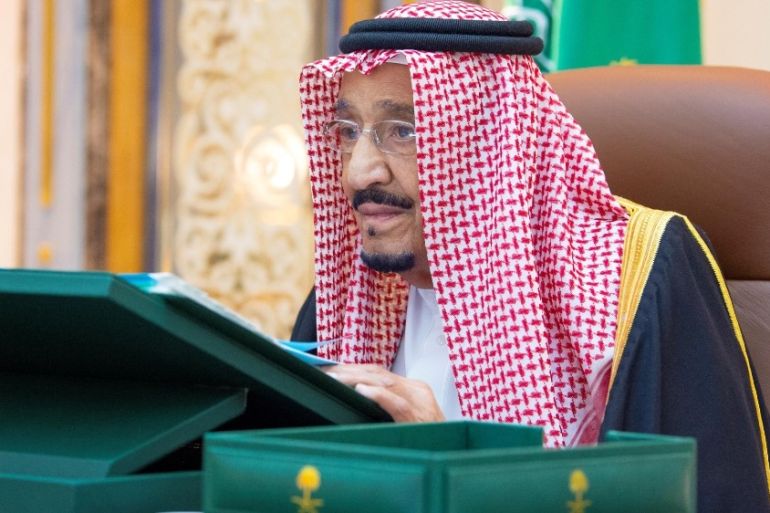Saudi king denounces Iran’s ‘expansionism’ in fiery UN speech

Saudi Arabia’s King Salman bin Abdulaziz took aim at Iran during his debut on Wednesday at the annual United Nations meeting of world leaders, calling for a comprehensive solution to contain Riyadh’s regional rival and to stop it from getting weapons of mass destruction.
He said Iran has exploited a 2015 nuclear deal with world powers “to intensify its expansionist activities, create its terrorist networks, and use terrorism”, adding this had produced nothing but “chaos, extremism, and sectarianism”.
Keep reading
list of 4 itemsSaudi energy minister warns oil price gamblers ‘make my day’
Canadian rights groups urge Trudeau to end Saudi arms sales
Saudi Arabia to gradually resume Umrah pilgrimage
“A comprehensive solution and a firm international position are required,” he told the 193-member General Assembly in a video statement. “Our experience with the Iranian regime has taught us that partial solutions and appeasement did not stop its threats to international peace and security.”
Iran’s UN mission spokesman Alireza Miryousefi rejected what he called “the baseless allegations”.
“The unconstructive and unwarranted statement by the Saudi leader only emboldens certain powers who are intent in sowing discord among regional countries with the aim of creating permanent division and selling more deadly weapons to the region,” he said in an apparent swipe at the United States.
Sunni Muslim-majority Saudi Arabia and Shia-dominated Iran are locked in several proxy wars in the region, including in Yemen where a Saudi-led coalition has been battling the Tehran-aligned Houthi movement over five years.
King Salman, 84, said the Middle East has been suffering from major political and security challenges, blaming Iran for much of the region’s instability. He also accused the Iran-backed Hezbollah group in Lebanon of sowing the political disarray that has been ultimately blamed for the devastating explosion at Beirut’s port last month.
“This terrorist organisation must be disarmed,” the king said.
‘Forces of evil’
Hillary Mann Leverett, a former US official and CEO of political risk consultancy STRATEGA, noted King Salman prefaced his comments about Iran with the phrase “forces of evil”, adding Saudi Arabia is still sensitive about an “unanswered” attack on the kingdom’s oil facilities last year that was blamed on Tehran.
“That continues to be a sore spot and to have it articulated by the king of Saudi Arabia before the entire world shows the importance the king still attaches to how the United States handles Iran and its policy in the region,” Mann Leverett told Al Jazeera. “It’s a question about whether the Trump administration would really come to their defence if something even worse happened to them.”
Reading from a piece of paper and seated at a desk under a large portrait of his father, King Salman reiterated the sacred role of Islam in Saudi Arabia, which Muslims believe was revealed to the Prophet Muhammad more than 1,400 years ago in the mountainous caves of Mecca.
He refrained from criticising the recent deals struck by the United Arab Emirates (UAE) and Bahrain to establish ties with Israel. But on attempts to mediate peace between Israel and the Palestinians, the Saudi monarch said a 2002 Arab peace initiative is the basis for a “comprehensive and just solution” ensuring the Palestinians obtain an independent state with East Jerusalem as its capital.
“We support the efforts of the current US administration to achieve peace in the Middle East by bringing the Palestinians and the Israelis to the negotiation table to reach a fair and comprehensive agreement,” said Salman.

‘A real rejection’
Saudi Arabia, the birthplace of Islam and site of its holiest shrines, drew up the 2002 initiative by which Arab nations offered to normalise ties with Israel in return for a statehood deal with the Palestinians and full Israeli withdrawal from territory captured in 1967.
Palestinian leaders have condemned the UAE and Bahrain’s warming of relations with Israel, describing it as a betrayal of their efforts to win statehood in the occupied West Bank and Gaza Strip.
Mann Leverett noted there have been reports about differences within the royal family, particularly between King Salman and Crown Prince Mohammed bin Salman, on whether Saudi Arabia will follow others in the region and normalise ties with Israel.
“So this was an opportunity to publicly before the world reiterate Saudi Arabia’s long-standing position … that there needs to be two states – an independent state of Palestine with its capital East Jerusalem. That’s a clear re-affirmation of Saudi Arabia’s stand and a real rejection of the current efforts to push Arab states to normalise with Israel. That was critically important,” she said.